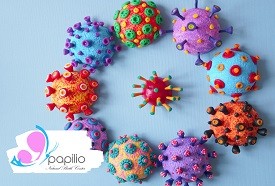Covid-19 and Pregnancy, What You Need to Know

If you're pregnant, it's understandable if you feel worried about the coronavirus during this period of pandemic. Here's what moms-to-be should know now.
Being pregnant can already be stressful, but it’s even more overwhelming given the spread of the novel coronavirus and COVID-19, the disease it causes. The virus has rapidly spread all over the world, bring a huge impact at any level.
The coronavirus that is circulating today was only recently found to infect humans, according to infectious disease expert Amesh A. Adalja, M.D., senior scholar at the Johns Hopkins Center for Health Security. There’s a lot scientists are still trying to learn about it.
Scientists are still trying to learn more about how this virus impacts pregnancy. Here's what we know right now:
?Pregnant women are immunocompromised and therefore more susceptible to complications of respiratory infections like the coronavirus, so experts recommend doing your best to follow certain precautions, like practicing good hand hygiene — an important step at any time.
?A small study of nine pregnant women in Wuhan, China, with confirmed COVID-19 found no evidence of the virus in their breast milk, cord blood or amniotic fluid.
?In May, a small study of 46 pregnant women with symptomatic COVID-19 published in the American Journal of Obstetrics & Gynecology found that most had mild cases, but some developed breathing problems.
?A small retrospective study published in The Lancet reviewed obstetric and neonatal outcomes of seven pregnant women at a hospital in Wuhan who had contracted COVID-19 in their third trimesters. The outcomes for all seven moms were good; none were admitted into intensive care and all were later discharged from the hospital.
?A small study of 43 pregnancy women in New York with confirmed COVID-19 published in the American Journal of Obstetrics & Gynecology in April found that unlike SARS and H1N1, pregnant women do not seem to experience more severe illness from the coronavirus compared to the general population.
?A study published as a letter in The New England Journal of Medicine looked at testing data from pregnant women who delivered between March 22 and April 4 at New York–Presbyterian Allen Hospital and Columbia University Irving Medical Center in New York City. Although the study was small, focusing on just 215 moms-to-be, 88 percent of the women who tested positive for COVID-19 did not show any symptoms.
?A research letter published in JAMA in late May analyzed testing data from 782 pregnant women admitted for birth at three Yale New Haven hospitals in Connecticut. Of those women, 12 (1.5 percent) had previously tested positive for SARS-CoV-2, the virus that causes COVID-19. In the rest of the women, 30 (3.9 percent) tested positive for SARS-CoV-2 and 22 (73.3 percent) of those didn’t have symptoms. Eight of 14 women with symptoms (47 percent) tested positive. Overall, 22 (2.9 percent) of patients without symptoms tested positive. Based on the findings, the researchers concluded that COVID-19 rates among pregnant women are fairly low.
?A research letter published in Infection Control & Hospital Epidemiology analyzed electronic health data of women giving birth at four affiliated hospitals with Mass General Brigham Health from mid-April to early May for COVID-19 test results. It found that 7.9 percent of pregnant women with COVID-like symptoms and a 1.5 percent of pregnant women with no symptoms tested positive for COVID-19 at four Boston hospitals.
Because there are still so many unknowns about how the coronavirus impacts pregnant women, it’s essential to follow social distancing guidelines.
Despite the unknowns, all pregnant women have the right to receive a safe delivery with minimum interventions whether they are confirmed COVID-19 or not. We suggest expectant mothers to search care providers or delivery service facilities first and make sure they get comfortable and safe services as follow:
- Health care providers should respect and value their patients' birth plan, having a good manner in practicing a syar'i and natural way of labor based on the teachings of Qur'an.
- Health care providers must be updated with the latest information about COVID-19 in order to provide informed consent for the patients.
- Pregnant mothers should have the freedom of choice to fulfill their birth plan.
- Non-medical techniques such as massage and a warm bath should be given first instead of medical intervention to help with pain management during labour.
- During labor, mothers are free to choose any possible position which comfortable the most.
- In a healthy and normal condition, supports the early initiation of Breastfeeding (IMD) with the following guidelines: skin-to-skin contact shortly after delivery for one hour minimum and early initiation or early attachment for no more than one hour. Then the mother should be supported for exclusive breastfeeding that benefits the baby's immune systems to increase survival rate among neonates. Early initiation of breastfeeding has been shown to increase neonatal mortality and is substantially has greater benefits than the potential risk of transmission of COVID-19.
- Whether it is corfirmed positive Covid19 not, mothers should always be supported for safe and comfortable breastfeeding process, increase skin-to-skin contact between mother and baby, and rooming in. Various Evidence suggest breastfeeding decreases mortality rate of neonates and provide long life immunity. Mothers should be taken care of in a good quality services including antenatal and intrapartum examinations to avoid the risk of bleeding and to prevent baby blues syndrome.
May Allah ‘azza wa jalla Bless us all, showers his countless blessings on us, and keep us safe and sound in all respects. Aamiiin Ya Robbal ‘aalamiin.




